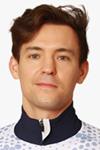

Men ISR
ISR
Vladislav Bykanov
- Date of birth19 Nov 1989
- Height186 CM
- ProfessionAthlete
- HometownHeerenveen
- Place of birthLvov
- Start skatingHe first tried short track in 1998 at the Canada Centre in Metula, Israel.
- Club Ozma: Holon, ISR
- HobbiesCycling. (Instagram profile, 11 Nov 2021)
- LanguagesDutch, English, Hebrew, Russian
- Other nameVlad (fromthegrapevine.com, 07 Feb 2018)
- FamilyPartner Rianne Jorritsma
- CoachN/A
- Former CoachN/A
- General Interest
- Sport Specific Information
Winning the 1500m by a lap at the 2016 World Cup event in Dordrecht, Netherlands. (Athlete, 06 Nov 2018)
He was flag bearer for Israel at the opening ceremony of the 2014 Olympic Winter Games in Sochi. (ONS, 07 Feb 2014)
"It's not only about speed, it's not only about technique. It's your tactics, how you feel that day, how the ice is. If you take the same race and run it 20 times, you are going to have 20 different outcomes. It's great, the unforeseen result." (isu.org, 31 Jan 2019)
British ski jumper Michael Edwards [Eddie the Eagle]. (Athlete, 06 Nov 2018)
In 2014 he became the first male athlete from Israel to compete in short track at the Olympic Winter Games. (SportsDeskOnline, 02 Oct 2018)
Coach Jeroen Otter. (Athlete, 06 Nov 2018)
In October 2022 he announced that he would miss the 2022/23 season due to a hip injury that required surgery. (Instagram profile, 10 Oct 2022; schaatsen.nl, 01 Oct 2022)
He was unable to compete for eight months following hip surgery in 2015. He had a second hip operation prior to the 2016/17 season. (isu.org, 23 Nov 2016; Athlete, 10 Dec 2015)
He required stitches to a cut after falling during a competition in 2014. (fromthegrapevine.com, 02 Jul 2015)
In 2011 he missed four months with a broken ankle. (Athlete, 06 Nov 2018)
He was out for three months with a broken ankle in 2007. (Athlete, 10 Dec 2015)
He was unable to compete for eight months following hip surgery in 2015. He had a second hip operation prior to the 2016/17 season. (isu.org, 23 Nov 2016; Athlete, 10 Dec 2015)
He required stitches to a cut after falling during a competition in 2014. (fromthegrapevine.com, 02 Jul 2015)
In 2011 he missed four months with a broken ankle. (Athlete, 06 Nov 2018)
He was out for three months with a broken ankle in 2007. (Athlete, 10 Dec 2015)
WELL TRAVELLED
Born in Lviv in the former Soviet Union, he moved from Ukraine to Israel in 1994. In 2009 he spent time training in Calgary, AB, Canada, where he met Dutch coach Jeroen Otter. When Otter returned to the Netherlands, Bykanov followed him and made his base there. He is happy with the support he receives from his national federation, which allows him to train abroad, but he hopes to be able to base himself in Israel one day. "Although we have access to good facilities and coaches, it is not in Israel and that is the problem. It is a shame I think, it would be better to train in your own country with your own language. It is always nice to get out there and see the best skaters and athletes in the world and how they train. At the end of the day you want to be in your own country, but I am used to it now. Although you miss friends and family, you do get used to it." (isu.org, 23 Nov 2016; iisf.org.il, 16 Sep 2009)
FUTURE PLANS
He hopes to find a role developing short track in Israel once his sporting career is over. As a management and economics student, he feels he would be well-suited to a position overseeing the sport within the Israel Ice Skating Federation. "When I am done skating I would love to start producing more athletes for Israel. We are building a couple of new ice rinks around the country. There are more coming every couple of years. I hope I can be part of it. Not coaching but I hope running the sport, developing it, [having] oversight. Of course I want to put my experience into it and help the kids and the coaches but I would love to do more oversight. It's also what I am studying - management and economics." (isu.org, 31 Jan 2019)
Born in Lviv in the former Soviet Union, he moved from Ukraine to Israel in 1994. In 2009 he spent time training in Calgary, AB, Canada, where he met Dutch coach Jeroen Otter. When Otter returned to the Netherlands, Bykanov followed him and made his base there. He is happy with the support he receives from his national federation, which allows him to train abroad, but he hopes to be able to base himself in Israel one day. "Although we have access to good facilities and coaches, it is not in Israel and that is the problem. It is a shame I think, it would be better to train in your own country with your own language. It is always nice to get out there and see the best skaters and athletes in the world and how they train. At the end of the day you want to be in your own country, but I am used to it now. Although you miss friends and family, you do get used to it." (isu.org, 23 Nov 2016; iisf.org.il, 16 Sep 2009)
FUTURE PLANS
He hopes to find a role developing short track in Israel once his sporting career is over. As a management and economics student, he feels he would be well-suited to a position overseeing the sport within the Israel Ice Skating Federation. "When I am done skating I would love to start producing more athletes for Israel. We are building a couple of new ice rinks around the country. There are more coming every couple of years. I hope I can be part of it. Not coaching but I hope running the sport, developing it, [having] oversight. Of course I want to put my experience into it and help the kids and the coaches but I would love to do more oversight. It's also what I am studying - management and economics." (isu.org, 31 Jan 2019)
He has represented Israel in speed skating, competing in mass start at the 2018 World Cup event in Heerenveen, Netherlands. (SportsDeskOnline, 06 Mar 2019)
He wanted to try something new. "A skating centre opened near where I lived. After about an hour on the ice I was hooked. It felt so natural, I always tell people that it must be in the genes. Short track attracted me because you race against people. You don't race against yourself. You have passing, speed, pushing, falling. It's more contact and close to other skaters than just going fast."



